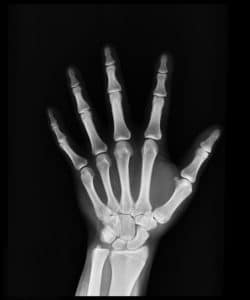Individuals with osteoporosis in Burbank must contend with fragile bones that make the possibility of a fracture or other serious injury more likely. A little-known side effect of the bone disease is hearing loss.
What Causes Osteoporosis?

Osteoporosis is a bone density disease that causes weakened, fragile bones that can break easily. It affects an estimated 54 million Americans and can strike at any age but is most common in those aged 50 and older. Around half of all women and 25 percent of men over the age of 50 will break a bone as a result of osteoporosis.
Low bone mass is the most serious complication from osteoporosis. This increases the risk of substantial bone loss and fractures; the hips, spine and wrist are most susceptible. The majority of these fractures are the result of falls, but in some cases, minor bumps – or even something as seemingly innocent as a sneeze – can lead to a broken bone. Other side effects of osteoporosis include a stooped or hunched posture as a result of height loss; limited mobility; isolation and depression. Sadly, 20 percent of elderly patients in Burbank who break a hip will end up dying of complications from their fracture within a year.
Another complication of osteoporosis, one that few ever think of, is hearing loss.
How Low Bone Density Affects the Ears
When sound waves enter your ear canal, they strike the eardrum, a thin membrane attached to a trio of tiny bones in the middle ear called the ossicles. Because the disease weakens bones, the ossicles can be affected, too; damage to these bones may result in hearing loss. One such bone of the ossicles — the stapes — is one of the smallest bones in the human body, making it particularly susceptible to fracture.
Other Risks of Osteoporosis
When hearing loss occurs as a result of osteoporosis, it can come on suddenly. One recent study examined 10,000 patients with osteoporosis and found they were 76 percent more likely to develop sudden sensorineural hearing loss compared to individuals without the bone disease. They are also more likely to experience tinnitus, a ringing or other phantom sound in the ears.
Due to the seriousness of bone fractures, anybody over the age of 50 who has been diagnosed with osteoporosis should receive annual hearing screenings, according to your Burbank audiologist. This is especially important in elderly patients, whose risk of experiencing a fall is already higher.
